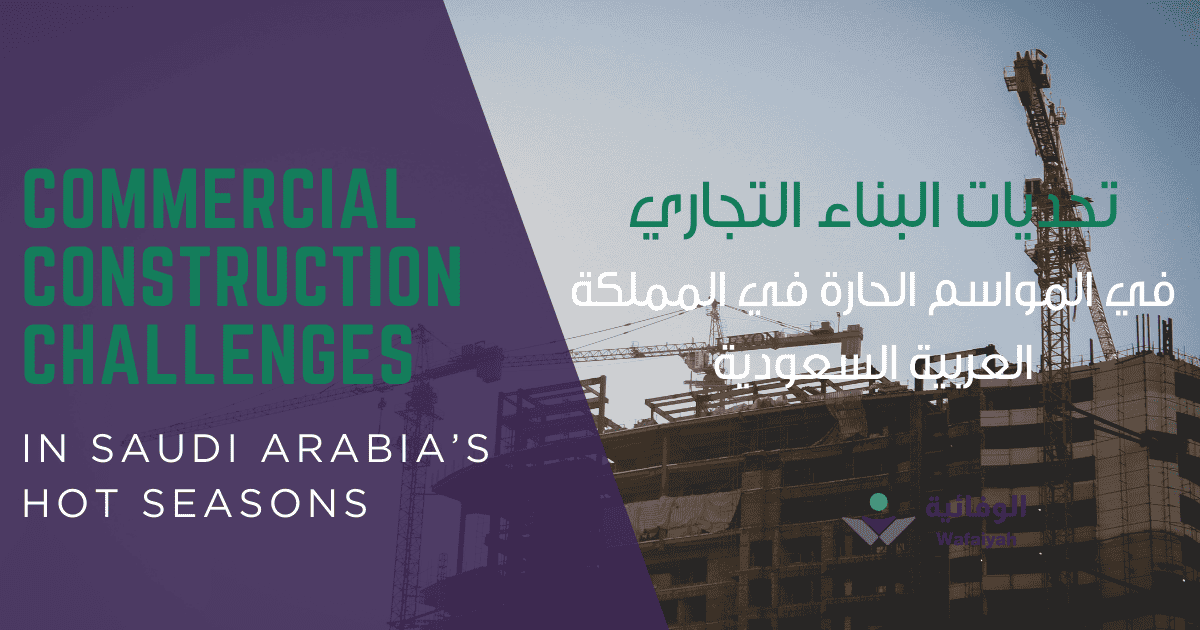Commercial construction always faces unique challenges, but none quite like the ones faced in Saudi Arabia, especially in the summer months with its extreme heat. Workers routinely perform in temperatures exceeding 45°C (113°F), heat indices that test the physical endurance of construction workers as well as the materials used, machinery, and schedules. Even simple tasks in Riyadh, Saudi Arabia, come with weather-related challenges such as heat stress, pour and cure, winds, the productivity of the labor force, etc. Certainly, industry professionals face a very long list of challenges. Still, they all require strategies, planning, permitting, and, more importantly, a team approach to mix together in a safe manner to execute such tasks.
Commercial Construction
Commercial construction is all about business activity in buildings, office spaces, retail outlets, warehouses, hotels, and shopping centers, linking projects together. The difference between commercial construction and residential construction is not just the size of the project; there are many more complex styles of design, along with more interfaces with regulations. Commercial construction is considered an economic generator for communities, as it is so important and helps facilitate the infrastructure of regions to allow for the growth of business, residential, and towns. In short, commercial construction involves projects that move from site preparation to fit-out completion, commonly working with architects, engineers, contractors, and planning departments for various government authorities to ensure compliance with functional, performance, and safety standards.
1. Heat Stress and Worker Safety
Saudi Arabia witnesses the hottest summers in the world. Construction workers are routinely subjected to extreme heat conditions, often beyond 45ºC (113ºF). Extreme heat can cause severe, potentially fatal, health ramifications, including heat exhaustion, dehydration, and heat stroke, should the limits of the human body’s internal temperature be exceeded. Suppose preventive measures are not implemented to protect workers from the hard external climate. In that case, a medical emergency may result if extreme heat is prolonged. Employers must put in place strict employee safety protocols, including shaded rest areas, water station adherence, and breaks on the hourly schedule. Importantly, PPE or personal protective equipment must be heat-resistant, and training must be provided regarding workers recognizing the early signs of heat stress.
2. Decreasing Labor Productivity
High-temperature extremes adversely affect the physical capabilities, performance, and endurance of construction workers. Extreme environmental conditions lead to extreme internal fatigue that quickly halts the exertion of physical activity and decreases productivity. Consequently, many projects are subject to delayed timelines and increased labor costs. To alleviate exposure to extreme heat, contractors regularly shift the work hours of construction schedules to the early morning and evening time slots, thereby closing the door on longer work-hour shifts in one day. Keeping productivity in constant check while never losing sight of the health of the worker continues to be a struggle with the balancing act.
3. Concrete Curing Problems
Concrete is very temperature sensitive and, in hot climates, loses sufficient moisture too fast to appropriately cure. If the water evaporates too quickly during the curing process and concrete shrinks before gaining enough strength, shrinkage cracks can be expected. For this reason, contractors must regularly employ special curing compounds, shading techniques, and/or continuous water spraying during curing, adding not only complexity but also cost. If improperly managed during curing, the durability and existence of a multi-residential or commercial building could be greatly compromised.
4. Equipment Overheating
Construction machinery, including excavators, loaders, and generators, are vulnerable to overheating in the heat of the Saudi Arabian summer. If equipment like engines and hydraulic systems are not properly maintained or cooled, this could result in a mechanical failure, which can lead to costly repairs and, worse, project delays. Equipment downtime interrupts workflow and sometimes can overrun budgets by delaying timelines and placing multiple pressures on project schedules. This can then be reflected in increased maintenance routines and sometimes with the purchase of material that is made for higher temperature tolerability.
5. Deformation of Material and Quality Control
Materials such as asphalt, steel, and plastics react to heat in that they expand, soften, or warp. Loss in quality or precision of installation can result from material reactively expanding. For example, steel structures can expand minimally but cause joints or fixture alignments to change. Also, asphalt pavement can expand and become too soft to be used for some applications during the peak of the summer. Construction teams must monitor how the performance of material will react and enforce corrective actions to ensure a quality product.
6. Scheduling Abilities
Many construction tasks can only take place during the early morning or late evenings, so the unbearable heat usually limits construction hours to a day’s work. While this limitation better protects workers from the elements, it is at the expense of team protection that can impact the coordination of project teams, equipment availability, and project timelines. While night shifts allow for daytime work limitations, the realities of additional labor costs, supervision, and provision of a safe working environment must be accepted.
7. Increased Cooling and Utility Costs due to heat
Cooling is needed in temporary site offices, break areas, and storage buildings to keep workers comfortable and safe on-site. The air-conditioning system can consume a tremendous amount of electricity, adding to the project’s operational costs. The use of electricity can also be increased with the need for water to cool down concrete where it is poured under the heat of the sun and hydration for the workers. Increasing these utility costs can raise the overall project construction cost during the hot season and make project schedule planning and cost control less favorable.
Preventative Measures
1. Smart Scheduling and Shift Management
Have a fluid schedule to work during cooler hours of the day, early mornings, and evenings. Utilize rotating shifts to help with worker fatigue and output. Night shifts can also be added to help with production and ensure proper lighting and supervision are in place.
2. Heat-Tolerant Materials and Curing Techniques
Utilize heat-tolerant materials, including specialized concrete locations such as heat-resistant concrete mixes and UV-proof coatings. As a preventative approach, using new curing techniques such as moisture-retaining blankets, curing compounds, controlled evaporation systems, or specialized curing equipment would be beneficial!
3. Technology Based Site Monitoring and Cooling Systems
Utilizing IoT-based site monitoring tools to record real-time heat exposure, performance metrics, and workers’ health and safety can only assist the construction management process regarding productivity and site safety. Rest areas should be properly outfitted with efficient but cooling HVAC systems installed where possible. There are also portable misting fans or cooling stations available for rent that could significantly reduce heat stress and protect a worksite by keeping it cooler and more comfortable for everyone’s safety!
4. Saudi safety protocols and employment regulations
Strictly adhere to the safety guidelines as imposed by the Saudi Ministry of Human Resources and Social Development (HRSD) and abide by the Saudi building code. To satisfy legality, regulations establish temperature level restrictions for working in high temperatures by way of restrictions against mid-day work during peak summer months (usually 12pm to 3pm), implementing PPE, providing rest breaks in shaded areas, providing hydration stations requiring constant water access, requiring bona fide emergency plans with procedural chains and effective communication measures to report incidents, conducting safety audits, conducting safety training with laborers, and considering safety measures with on-site supervision.
Wafiyah: Leading Commercial Construction Projects in KSA
Wafiyah represents a trusted name in commercial construction with a reputation for quality, performance, and on-time completion of the Department of Municipal and Rural Affairs-approved iconic buildings and public-private partnership projects across the Kingdom. That said, Wafiyah has been successful in the broad construction context, managing solemn high-profile projects of many types, including retail and allied complexes, office buildings, medical facilities, and industrial facilities that maintain appropriate low levels of quality indicators that are met only a few of the many increasingly high-performance expectations needed from the simplest of commercial developments.
Wafiyah manages the Wafiyah team, which consists of engineers, technical professionals, project managers, field technicians, and many other skill trades to provide efficient, low- cost, sustainable solutions. Wafiyah looks at the many issues confronting all participants in the construction process to ensure the expected outcomes of those plans are met. Wafiyah prides itself in assessing all aspects of commercial construction, which is developed through the applications of new construction technologies, promoting agility while maintaining the efficiency of the overall project by having a high standard of safety in placing expectations of compliance on the client.
Frequently Asked Questions
What types of commercial projects does Wafiyah handle?
Wafiyah handles offices, retail centers, warehouses, and industrial buildings across KSA.
Does Wafiyah offer turnkey construction solutions?
Yes, Wafiyah provides end-to-end services from planning to project completion.
Is Wafiyah experienced with large-scale projects?
Absolutely. Wafiyah has a strong portfolio of large and complex commercial projects in Saudi Arabia.
How does Wafiyah ensure project quality and safety?
Wafiyah follows strict quality controls and safety protocols throughout every phase.

